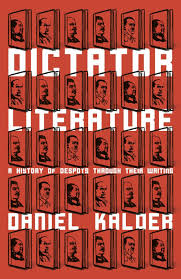
This article is a preview from the Summer 2018 edition of New Humanist
Dictator Literature: A History Of Despots Through Their Writing (Oneworld) by Daniel Kalder
Circa the turn of the 21st century, perusing the gift shop of the Palestine Hotel in Baghdad, my eye was caught by a handsome box set of slender hardback volumes. The case was – or rather is, as I have it before me as I write – green, with the gold eagle emblem of Iraq emblazoned on both sides. The books contained therein were On History, Heritage and Religion; On Iraq and International Politics; The Revolution and the Young; On Current Affairs in Iraq; One Trench Or Two?; and The Revolution and Woman in Iraq. They were all the work of Saddam Hussein, and they were all – unless they get racier after the first dozen pages; I will never know – remorselessly, deadeningly tedious.
This, as Daniel Kalder’s terrific Dictator Literature makes clear, means that Saddam’s literary excursions are very much the rule, where writing by tyrants is concerned. I have, in my peregrinations, acquired further confirmation of this thesis: books by Muammar Gaddafi, Enver Hoxha and Mao Zedong, among others which I am about as likely to eat as ever finish reading. Kalder, previously the author of two very good books about quirky corners of Russian history and geography, appears to have actually ploughed through all of these, and many more besides: memoirs, manifestos and novels. Whatever he was advanced to perform this undertaking, it wasn’t enough.
The paradox underpinning Kalder’s quest is that the authors of the works under consideration are extraordinary figures, who led fascinating lives that had an immense impact on human affairs – yet are invariably revealed by their own words as dreary, hectoring cranks. “To a man,” writes Kalder in the introduction, “they almost always produce mind-numbing drivel. I wanted to know why.”
Kalder diligently explores the works of Hitler, Stalin, Lenin, Mussolini, Franco, Khomeini, Niyazov, Castro, the Kim dynasty and others. The question is whether these torrents of verbiage give an insight into the souls of their composers – and, perhaps more importantly, into the thinking of those legions who have been seduced by these dreadful books. It is a depressing line of inquiry, to the extent that Kalder finds himself occasionally wondering whether the advance of literacy can be acclaimed an unequivocal boon. Kalder gets himself – and his reader – through with a bleary wit and an inventive lexicon of abuse, although he does find that Colonel Gaddafi’s mercifully brief Green Book defeats any attempt at rococo insult (“It is not merely boring, or banal, or repetitive, or nonsensical, although it is certainly all of those things. It is, quite simply, stupid”).
Hannah Arendt’s phrase “the banality of evil” might have served as an alternative title for Dictator Literature – a book which is, among many other things, a sobering reminder of how the dullest of men can bend the world to his will if he’s willing to expound upon it at sufficient length. (There is a case that every tyrant has triumphed at least partly through the collective hope of their people that if they get what they want, they might shut up.)
There may, of course, be a simpler reason why so many books by despots are so bad: what with one thing and another, it might be a struggle to find people willing to volunteer as editors.

